Address any questions or comments regarding this newsletter to the individual authors listed after each article or to its editors, Nathan Johanning, 618-939-3434, njohann@illinois.edu or Bronwyn Aly 618-695-6060, baly@illinois.edu. The Illinois Fruit and Vegetable News is available on the web at: http://ipm.illinois.edu/ifvn/. To receive or be removed from email notification of new postings of this newsletter, contact Nathan Johanning or Bronwyn Aly at the phone numbers or email addresses above.
In This Issue:
Upcoming Programs ((listings for beginning and established growers))
News & Announcements ((Illinois Specialty Crops Conference January 8-10, University of Illinois Extension Welcomes 3 New Local Food Systems & Small Farms Educators))
Regional Reports ((St. Louis Metro East, southern Illinois, Dixon Springs))
Fruit & Vegetable Production & Pest Management ((Price Premiums of Organic Produce: Examining Regional Variations))
Upcoming Programs
See the University of Illinois Extension Local Food Systems and Small Farms Team’s website at:
http://web.extension.illinois.edu/smallfarm/ and the calendar of events at http://web.extension.illinois.edu/units/calendar.cfm?UnitID=629.
- Illinois Farmers Market Association 2019-2020 Winter Webinars. If you are looking for great webinars that have a market focus check out this series from ILFMA and University of Illinois Extension. They are hosting one per month, between now and March 2020. Registration for the webinars listed below can be found here: Check it out! For more information, contact Laurie George ljgeorge@illinois.edu
- January 13, 2020 “Food Safety Modernization Act (FSMA) Produce Rule for Farmer’s Markets: Is It Required?
- February 10, 2020 “Inside Look at Successful Chef Demos at the Market
- March 16, 2020 “The Future of Farmers Markets – Building Collaborative Practices”
- 2020 Kentucky Fruit and Vegetable Conference, Sunday, Monday and Tuesday, January 5-7, 2020, Embassy Suites Hotel, 1801 Newtown Pike, Lexington, Kentucky 40511. For more information visit https://kyhortcouncil.org/2020kyfruitandvegconf/
- 2020 Illinois Specialty Crops Conference, January 8-10, 2020, Crowne Plaza, Springfield, IL. To register and find out more go to: www.specialtygrowers.org/iscc . See the article later in this issue for more details on the conference!!!
- Intro to Apple Tree Pruning: The Older and Neglected, Wednesday, Jan. 22, 2020. Held twic: 10 a.m. to Noon and again from 6 to 8 p.m. Highland Community College Student Conference Center Room 210 (Building H), 2998 W Pearl City Road, Freeport (use parking lot A). Registration cost for this program is $5 and pre-registration is required by Monday, January 20. To register or for more information on this program, visit www.go.illinois.edu/jsw or contact Grant McCarty gmccarty@illinois.edu or 815-235-4125.
- 2020 Southwest Illinois Commercial Tree Fruit School, Tuesday, February 4, 2020 at the Knights of Columbus Hall just south of Hardin, IL. Save the date and more information to follow!
- 2020 Southern Illinois Fruit and Vegetable School, Wednesday, February 5, 2020, Mt Vernon Doubletree Inn. This program includes separate tracks for small fruit, tree fruit and vegetable production. Save the date and more information to follow!
- 2020 Small Farm Winter Webinar Series, Thursdays from 12-1pm, from January 30-March 26, 2020. Watch for more details in the January issue!
- Indiana Hort Conference & Expo, February 11-13, 2020. Indianapolis Marriott East Hotel, 7202 East 21st Street, Indianapolis, IN 46219. For more details visit https://www.indianahortconference.org/
- 2020 North American Raspberry and Blackberry Conference, Tuesday-Friday, March 3-6, 2020 in St. Louis, MO. Save the date and watch for conference registration very soon! https://www.raspberryblackberry.com/2020-north-american-raspberry-blackberry-conference/
Hotel accommodations can be made now. Here is the link for hotel information: https://www.raspberryblackberry.com/conference-accommodations/ Don’t miss the opportunity to attend this national conference and learn more about caneberry production!
News & Announcements

Have you registered for the Illinois Specialty Crop Conference (ISCC) on January 8-10? Don’t miss your chance to attend this one of a kind event that will bring local farmers, organizations, and businesses together to network and help build the needed infrastructure for a long-lasting marketplace for farmers in Illinois. This engaging three-day conference is hosted by Illinois Specialty Growers Association in partnership with Illinois Farm Bureau, University of Illinois, and Illinois Department of Agriculture. To register and find out more go to: www.specialtygrowers.org/iscc
Whether you’re a farmer, distributor, or simply someone who loves to eat, you are part of farming. You want your part to grow. Illinois Specialty Growers Association wants you to not just grow but thrive. Specialty crop and small-scale farmers face unique challenges and markets. Workshops and training opportunities allow you the chance to hear about emerging crop disease, better understand crop management, gain new skills, expand business, and connect with others facing similar challenges. Our ISCC conference will help you learn how to increase profits, develop a sustainable business, and grow market demand to build long-lasting family farms.
Did you know that our ISGA General Membership and our exclusive member conference price is cheaper than a full-price conference fee? That’s right, we want to take this opportunity to connect you to our community so join ISGA today and save on your conference registration! Attendees and ISGA members gain exclusive password protected website access to conference presentations and materials!
CONFERENCE HIGHLIGHTS:
- Pre-conference workshops, including: Pumpkin Production, Cut Flowers, Protected Culture and Hemp
- Produce Safety Training Workshop. This workshop will satisfy the Food Safety Modernization Act (FSMA). Registration deadline for the FSMA Workshop is Dec. 20, 2019. Seating is limited. Certification and manual included in $50 registration.
- Keynote Speakers: Janice Person, JPlovesCOTTON, LLC and Hugh McPherson, Maze Master
- Vibrant Trade Show with over 60 vendors
- The 31st annual Apple Cider Contest and 18th annual Hard Cider Contest
- Thursday evening ticketed dinner banquet featuring speaker Ken Myszka from Epiphany Farms Hospitality Group
- Event networking event for our young and beginner farmers
- ISGA Annual Meeting held on Friday from 12:00-1:00p.m.
ILLINOIS VEGETABLE GROWERS ASSOICATION PHOTO CONTEST:
Online marketing, specifically website and social media presence, has become an imperative in marketing our agri-businesses. The IVGA recognizes that online marketing is crucial to the industry, while acknowledging how overwhelming implementing this type of plan can be! The IVGA would like to encourage and assist its members in this area. To that end, the IVGA is sponsoring a photo competition that will culminate at the 2020 ISGA conference in Springfield. The winner and runners up will be offered vouchers to be used with the marketing consultant of their choice to initiate or improve their farm’s online presence. The IVGA will be available to assist in locating a consultant local to the grower.
Details of the competition:
- Competition is open to any IVGA members (in attendance of conference or not) or any attendees of the 2020 annual conference.
- Submissions are due by Thursday January 9th, 2020, 2PM. Submissions may be emailed to Jennifer Kinney at: jenny@twingardensinc.com
- Photos submitted will represent your farm in some way. Two (2) submissions maximum per farm.
- Photos will be judged on the following:
- Marketability/Commercial Appeal
- Usage of Brand to reinforce theme
- Originality
- Artistic Merit
- Audience Appeal
- Humor or other Aspects of Creativity
- Story-telling -does the photograph help the viewer understand an aspect of the farm’s story.
- Winners will be announced at the Illinois Specialty Crop Conference Awards Banquet.
- Winner receives $400.00 reimbursement for online marketing.
- 1st runner up will receive $100.00 each reimbursement for online.
- 2nd runner up will receive a certificate.
- All participants’ submissions will be displayed in a slideshow at the IVGA booth inside the 2020 Conference Trade Show.
CIDER AND HARD CIDER CONTEST REGISTRATION:
To register for the Annual Cider Contest contact Ken Johnson, University of Illinois Extension. (217)243-7424 or kjohnson@illinois.edu
HOTEL ACCOMMODATIONS:
A block of rooms has been reserved at the Crowne Plaza Hotel at a rate of $103 per night. Please call the hotel directly at 217-529-7777 and ask for the Illinois Specialty Crop Conference room block to make reservations at the conference rate. The room block rate will close December 20.
EXHIBITOR AND SPONSORSHIP OPPORTUNITIES:
There are still sponsor and exhibitor opportunities available. Visit our website to learn more about our conference exhibitor and sponsorship packages. Choose a level that fits your needs. Your contribution will help strengthen the local food system in our communities.
University of Illinois Extension Welcomes 3 New Local Food Systems & Small Farms Educators
This past year has seen several changes within the University of Illinois Extension system that impacts specialty crop producers throughout the state (whether it is realized or not). More specifically, the addition and subtraction of Local Food Systems & Small Farms Extension educators and campus-based specialists. Extension educators and specialists work to provide stakeholders with research-based information to help them make informed decisions that will benefit their farming enterprises. The university is in various stages of filling vacancies including three local foods educator positions as well as the campus-based specialty crops entomologist. As you look at the last page of the newsletter, you will find the most current list of Extension educators and campus-based specialists as of press time for the final 2019 issue.
As we approach the end of 2019, I would like to welcome three recent additions to our Local Food Systems & Small Farms team, Katie Parker, Erin Harper, and Kathryn Pereira! Please feel free to reach out to these ladies and let them know who you are and how they may be able to help you in the future.
Katie Parker has joined the University of Illinois Extension as a Local Foods and Small Farms Educator serving the Adams, Brown, Hancock, Pike, and Schuyler counties. Growing up on a farm in Ursa, IL, Katie has been exposed to agriculture all her life. She earned a Bachelor of Science in Agriculture at Western Illinois University (WIU). While at WIU, Katie had the opportunity to conduct research on Field Pennycress as an alternative fuel source with Dr. Win Phippen. With a desire to learn more, she continued her education at the University of Illinois with a Master of Science degree in Crop Science. As a graduate assistant in Dr. Fred Below’s lab, Katie conducted research on commercial and precommercial product placement for corn and soybean.
Prior to joining the Extension team, Katie spent time in industry working as a research agronomist for startup companies and Bayer, conducting research on plant growth regulators, corn production systems, and trait evaluation.
Katie has a desire to provide support and educational resources to area farmers touching on topics such as dealing with farm stress, the legalization of hemp in Illinois, and corn and soybean management practices. As a local educator, she plans to provide programs and resources to women in agriculture through Annie’s Project. She also plans to reach out to local producers to better understand their needs and set up farm tours for community members to better understand how and where their food is grown. Feel free to contact her at keparkr2@illinois.edu or (217)223-8380.
Erin Elizabeth Harper has joined the University of Illinois Extension as a Local Foods and Small Farms Educator serving Champaign, Ford, Iroquois, and Vermillion counties. Erin grew up in central Illinois learning to grow and preserve food from her grandparents. They lived on an acre of land and grew or raised most of their food including fruits, berries, nuts, and vegetables. She attended the University of Illinois studying Natural Resources and Environmental Science and worked on the Sustainable Student Farm. She then went to Colorado State University and earned a graduate degree in Human Dimensions of Natural Resources. Erin is interested in how humans, agriculture, wildlife, and nature as a whole can function together in a sustainable and healthy way. Her focus will be on local food and production systems and natural spaces in our agriculture landscape. There are so many wonderful producers and contributors to our local food system in this state, and Erin hopes to meet many of you in the coming year. Feel free to contact Erin at harper7@illinois.edu or (217-333-7672).
Bronwyn Aly (618-382-2662; baly@illinois.edu)
Regional Reports
From the St. Louis Metro East…The entire St Louis Metro East is blanketed in snow, some areas as much as 8”. But typical of the region, temperatures are expected back in the 50s by the end of the week and into the next, just in time for holiday travel.
Registration is open for the Illinois Specialty Crops Conference, scheduled for January 8-10 at the Springfield Crowne Plaza (https://www.specialtygrowers.org/). Of special note: If you have not attended a Produce Safety Training as part of the Food Safety Modernization Act requirement, we will be offering the training on January 8th. Space is limited to 80 participants, so it is important you registered early. Remember, the training cutoff for everyone who is covered by the FSMA Produce Safety Rule is fast approaching (Jan 26th), so don’t miss this opportunity.
Elizabeth Wahle (618-344-4230; wahle@illinois.edu)
From southern Illinois... The last month overall has felt more winter like than fall in southern Illinois. We have been fairly wet and cold. We have had a few days not getting out of the 30s, but mainly in the 40s to 50 with mornings in the 20s or 30s. Precipitation has not been excessive, but when coupled with cool weather and limited drying, the soil has stayed wet. In Murphysboro, this last storm system delivered mainly rain and just a light, less than inch of snow, most of which was gone later the next day. However, by the time you get to Waterloo you crossed the freeze line and they received 6-7” of snow. The forecast looking ahead is dry and highs getting up to the mid-50s through Christmas.
Most fall vegetables in the field are done unless they have had row cover or some protection. In the high tunnel, crops like carrots, spinach, lettuce, and kale are still doing well, but growth has been slow with the cooler temperatures. Cover crop growth has been also slow. Oats have yellowed quite a bit and other winter-killed covers like radish are all but done growing. Later planted cereal rye is holding its own despite the weather. Below is a picture of the rye at the Baebler Education Farm near Waterloo, planted 11/4 for some trials. Even though small above ground, the root system continues to grow even with leaves aren’t and is helping hold the soil and scavenge nitrogen and other nutrients.
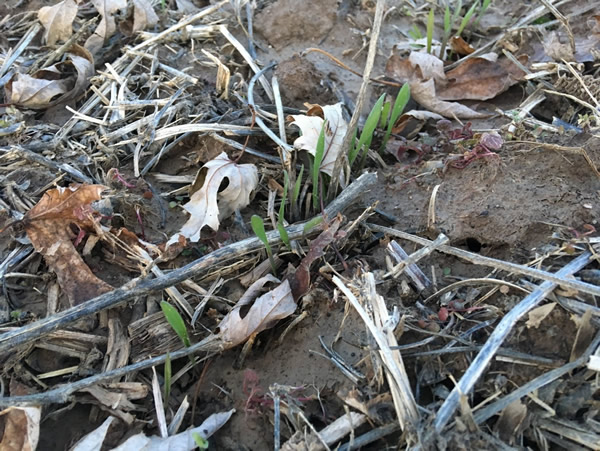
Cereal Rye growth at the Baebler Education Farm in Waterloo, IL on December 4th, one month after planting. Photo: N. Johanning
While there might be many things we cannot do out in the field now here are some things you can work on:
- Review soil test results and plan any needed nutrient applications for the spring.
- Take a look at your equipment. Think about things that need to be fixed, modifications that need to be made, or new equipment you might consider. We all have gotten out a piece of equipment the next year and thought “I was going to…” usually when we don’t have time to make that change and just make due. Also, consider what mechanization option are out there to help reduce labor and increase productivity. Although an investment, often they are very worthwhile and will gain you enough to justify the investment.
- Of course, make orders for seeds and plants for the next growing season. One good resource in variety selection is the Midwest Vegetable Variety Trial Reports https://ag.purdue.edu/hla/fruitveg/Pages/MVVTRB.aspx. While there are still reports coming in from 2019, this report also has an archive of many great trials on all kinds of crops from university research trials in the Midwest.
I look forward to seeing many of you at the Illinois Specialty Crops Conference January 8-10, 2020 in Springfield! One of our preconference workshops this year will again be on pumpkins and I look forward to sharing recent pumpkin research there. Merry Christmas!
Nathan Johanning (618-939-3434; njohann@illinois.edu)
From Dixon Springs Ag Center…Daily activities have slowed down tremendously, with only one high tunnel currently in production of winter vegetables. We are taking this time to review the 2019 growing season and preparing for adjustments heading into the next decade. Seed and supply catalogs are being scoured, the tunnels not in production have been cleaned out, sanitation of seeding, transplanting, harvest, and post harvest areas is underway, and any tunnel maintenance issues are being corrected.
For the tunnel in winter vegetable production, carrots were seeded on December 5th, completeing 5 of 7 planting dates for this crop. The September seeded carrot plots have been harvested but October and November seeded plots are no where near the harvest stage, which is to be expected given the decreased amount of daylight this time of year. Harvest of the September and October planted kale, spinach and lettuce plots continues, although the time between harvests has increased in the past month. The September planted plots have been harvested 7 times while the October planted plots have been harvested 3 times to date. The November planted plots are maturing very slowly, again to be expected as our daylength is so short this time of year. Observations and pictures from the first year of this project will be shared during the Illinois Specialty Crops Conference as well as at the Southern Illinois Fruit and Vegetable School (see upcoming programs section for dates and locations).
A winter high tunnel production workshop was hosted at DSAC on Monday, December 16, 2019. Those attending were able to walk through the tunnel and see the various planting date by production system plots set up for this project. Bed moisture, row covers, and temperature control were also discussed, and participants were able to “feel” first hand the amount of humidity that is generated inside high tunnels even in the winter. Also information about high tunnel structures and features was shared as the three tunnels at DSAC provide demonstrations of different set ups.
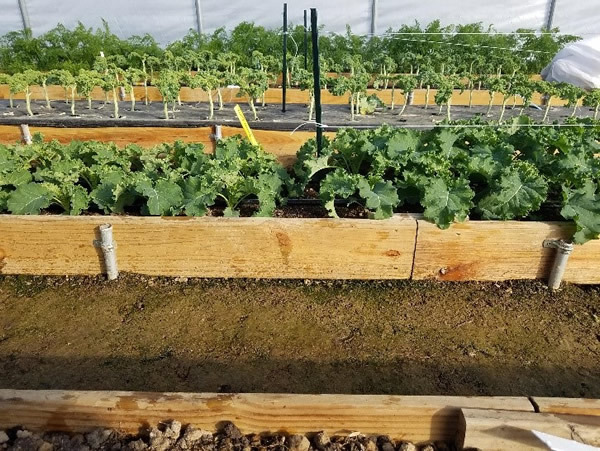
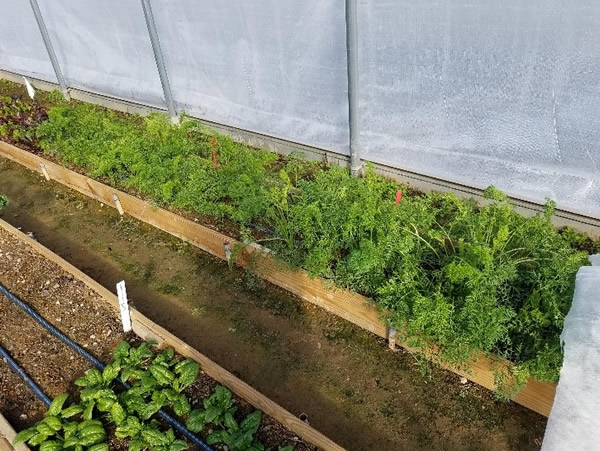
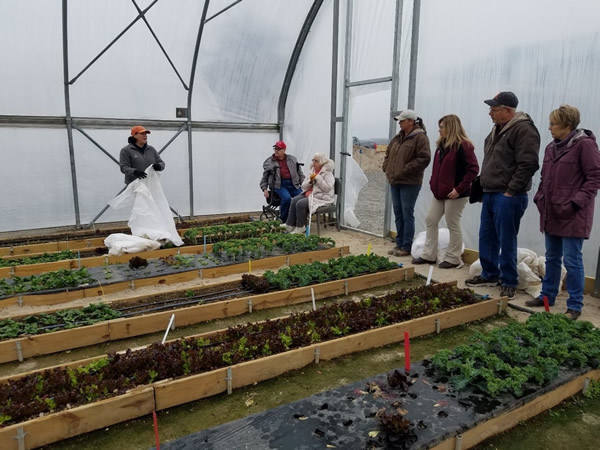
Winter High Tunnel Workshop at DSAC and high tunnel crop growth. Photos by K. Bell.
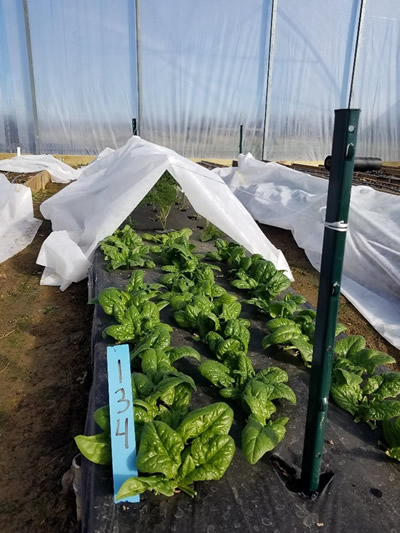
Bronwyn Aly (618-382-2662; baly@illinois.edu)
Fruit & Vegetable Production & Pest Management
Price Premiums of Organic Produce: Examining Regional Variations
When you walk into the grocery store today you see a growing section of foods labeled as organic or made with organic ingredients. What exactly does that mean? They must be better, they cost more, right? As a producer can I make more money if I sell them?
Many studies have been done concerning organic products. Researchers have looked at what type of consumer buys organics, and the concerns farmers have about growing organically. This particular study was conducted to gain a better understanding of the relative value of organic specialty crops in various regions. We tried to determine a general view or trend but do not offer detailed data about the prices of crops in specific regions. The study gives results as percentages so that comparisons can be made across different crops and locations. The focus of the research was to shed light on the relationship between price premiums and region.
For the statistical portion of my research, I chose to use the ordinary least squares (OLS) method to analyze the data. The OLS regression method was recommended by most of the studies that were reviewed prior to completing my research. Due to the nature of the information in this study, I used a technique that compared the differences between regions to a base or constant term. The base represented a combination of factors including a base variety for each crop, unit, season, and region. The base region for all four crops was the Midwest region, therefore all of the results will be in relation to the Midwest.
I used monthly retail price data from USDA’s custom average price tool. The Agricultural Marketing Service has several useful data sets, including the one that was chosen for use in this study. The prices that I gathered were monthly average prices from retailers in each region. Since the prices are an average, they do not represent a specific retail seller. I chose crops that I felt were widely consumed, and also produced in the Midwest. After reading the literature and considering crops that were most applicable to the Midwest, and more specifically southern Illinois, I selected apples, tomatoes, cucumbers, and strawberries. All four crops had ample data for both organic and nonorganic prices.
We know that organic products generally cost more. A portion of that higher price comes from increased production costs, as well as a high demand for organic crops. These factors, while important, are not the main focus of my research paper. I chose to look at geographic region specifically, and then controlled for differences based on variety, package size, and season of sale. That is, the premium or portion of the cost above nonorganic is caused in part by the geographic region, variety, package size, and season of sale. The regions were defined as Midwest, Northeast, Northwest, Southeast, Southwest, South Central, Alaska, and Hawaii. Alaska and Hawaii were included but not focused on in this study due to price effects caused by their unique locations. In order to make fair comparisons between the different crops and package sizes, the premium was transformed into a percentage. The non-organic price was subtracted from the organic price and the divided by the non-organic price.
After conducting the statistical tests for each of the four crops, there were several key points. The regions that had the biggest premium difference for apples and tomatoes were the Southwest, which includes California, and the Northeast, which includes New York. California has been identified as a leader in both organic production and consumption in other studies. Cucumber and strawberry premiums were not as affected by the region and did not show statistical differences. Premiums in the Southwest and Northeast were higher than in the Midwest for apples and tomatoes. On the other hand, cucumbers had a smaller premium in the Northeast when compared to the Midwest, and strawberries did not seem to be affected by any region. These regional differences confirm the diversity of the consumer base and may also show the complexities of production in different areas. Keep in mind that these premiums are based on retail prices and do not take into account the cost of production.
Unit of sale was another variable that I controlled for and was particularly interested in. I controlled for unit of sale to see if price discrimination was occurring. We often see price discrimination at the grocery store, when the small jar of peanut butter costs $3.00 and the extra-large jar only costs $4.50 even though it is more than double the size of the small jar. In this study I noticed a similar trend in the price premiums for apples. My data provided prices for 1lb, 2lb, 3lb, and 5lb units of sale for apples. I used 1lb as the base and compared the other units of sale to that. If price discrimination is happening the premiums collected should decrease as the package size increases. That does not mean the price decreases, only that the premium over nonorganic gets smaller. The results showed that there was no significant difference between 1lb and 2lb units of sale, but 3lb and 5lb units did have statistically significant lower values. The unit of sale did affect the size of the premium for apples as predicted.
The main take away from this study is to give producers an idea of the complex nature of organics especially for specialty crops. Organic crops generally have higher prices, but that does not necessarily mean a directly proportional higher profit. Organics may still be an excellent choice for some growers based on their cultural practices and environmental pressures. If you are considering growing organically because of the premium over nonorganic crops you should consider the attitudes of your local consumers toward organically grown produce and decide if the consumer demand is strong enough to support the higher price you will be asking. Generally, areas with higher population and healthy local economies tend to be more accepting of organic products, especially fruits and vegetables.
Katie Bell, Extension Intern, Dixon Springs & SIU Agribusiness Economics Graduate Student (klbell@illinois.edu)
Less Seriously
Saw this circulating around on my Facebook newsfeed and it caused a pretty good chuckle so thought I would share.
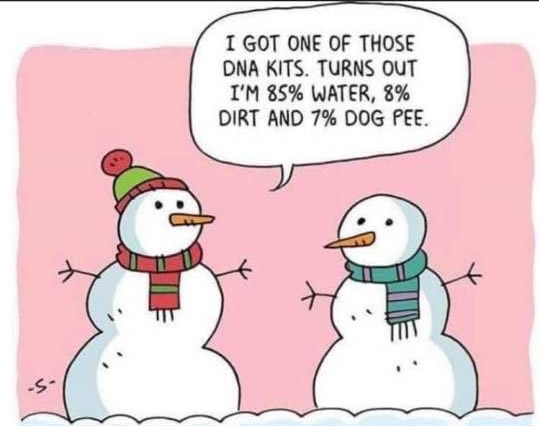
University of Illinois Extension Specialists in Fruit and Vegetable Production & Pest Management
Extension Educators – Local Food Systems and Small Farms |
||
Bronwyn Aly, Gallatin, Hamilton, Hardin, Pope, Saline, and White counties |
618-382-2662 |
|
Katie Bell, Franklin, Jackson, Perry, Randolph, & Williamson counties |
618-687-1727 |
|
Sarah Farley, Lake & McHenry counties |
847-223-8627 |
|
Nick Frillman, Woodford, Livingston, & McLean counties |
309-663-8306 |
|
Laurie George, Bond, Clinton, Jefferson, Marion, & Washington counties |
618-548-1446 |
|
Zachary Grant, Cook County | 708-679-6889 | |
Doug Gucker, DeWitt, Macon, and Piatt counties |
217-877-6042 |
|
Erin Harper, Champaign, Ford, Iroquois, and Vermillion counties |
217-333-7672 |
|
Grace Margherio, Jackie Joyner-Kersee Center, St. Clair County |
217-244-3547 |
|
Grant McCarty, Jo Daviess, Stephenson, and Winnebago counties |
815-235-4125 |
|
Katie Parker, Adams, Brown, Hancock, Pike and Schuyler counties |
217-223-8380 |
|
Kathryn Pereira, Cook County |
773-233-2900 |
|
James Theuri, Grundy, Kankakee, and Will counties |
815-933-8337 |
|
Extension Educators – Horticulture |
||
Chris Enroth, Henderson, Knox, McDonough, and Warren counties |
309-837-3939 |
|
Richard Hentschel, DuPage, Kane, and Kendall counties |
630-584-6166 |
|
Andrew Holsinger, Christian, Jersey, Macoupin, & Montgomery counties |
217-532-3941 |
|
Extension Educators - Commercial Agriculture |
||
Elizabeth Wahle, Fruit & Vegetable Production |
618-344-4230 |
|
Nathan Johanning, Madison, Monroe & St. Clair counties |
618-939-3434 |
|
Campus-based Extension Specialists |
||
Kacie Athey, Entomology |
217-244-9916 |
|
Mohammad Babadoost, Plant Pathology |
217-333-1523 |
|